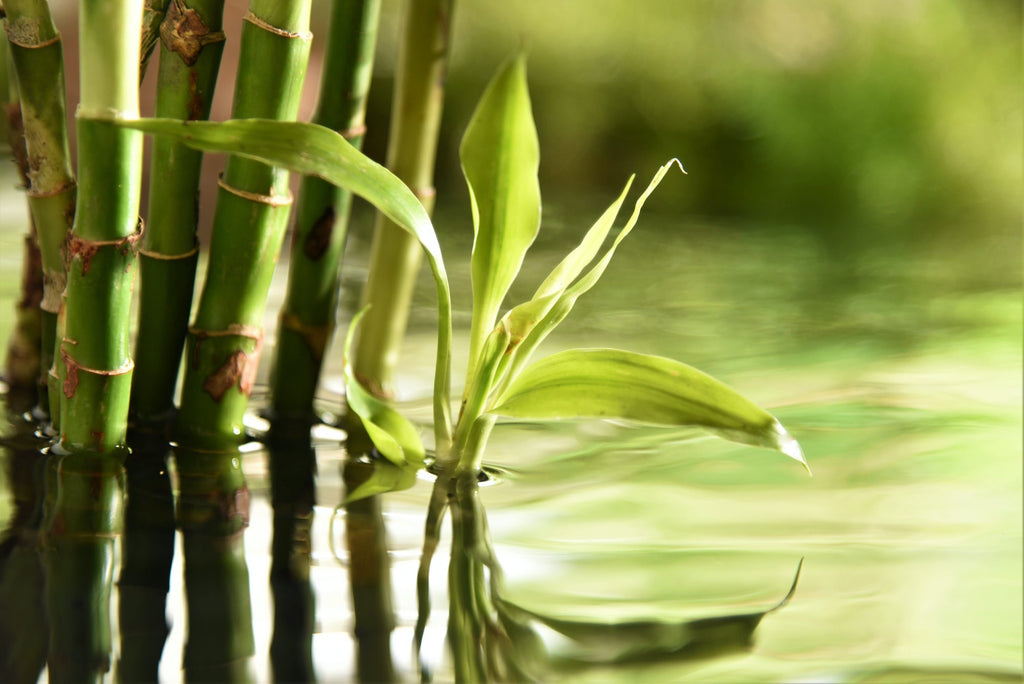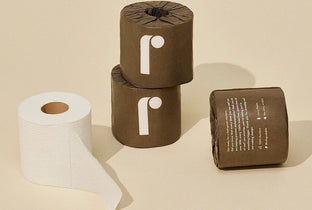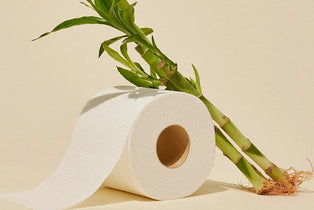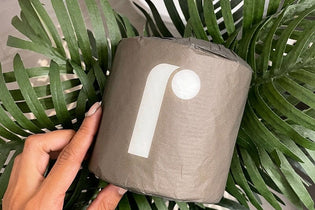
TLDR
How fast does bamboo grow? Pretty fast. But how fast does bamboo grow in a day? Probably faster than you think.
Bamboo is the world’s fastest-growing plant, shooting out of the ground at an astonishing four centimeters per second. At this rate, certain bamboo species can grow 91 centimeters (about 35 inches) in a single day.
If you thought that was impressive, get ready because we’ve only scratched the surface. In this short guide, we’ll dive into the factors that make bamboo plants a fast-growing crop, why it’s well-suited for various commercial uses like bulk toilet paper and bamboo toilet paper, and how it plays an integral role in keeping our environment intact.
The Details of Bamboo’s Remarkable Growth
Considering the speed of 91 centimeters of bamboo growth per day, that equates to a mind-blowing twenty feet in just a week. Less than one year later, you might find a bamboo plant towering over one hundred feet high.
So, what’s behind such remarkable growth? Simply put, a one-of-a-kind variety of grass. If you can manage to keep up, let’s take an even closer look at the common patterns of growing bamboo:
• The growth rates vary depending on the different types of bamboo you look at. The fastest-growing bamboo species can reach dizzying heights in a matter of weeks, reaching full maturity in the fraction of the time it takes most other species of vegetation.
• Unlike most species of trees, a bamboo forest can reach full maturity in a single growing season of 3-4 months.
• A bamboo culm can be ready to re-harvest in a mere 3-5 years; an equivalent stand of paper pulp trees will take 50-100.
• Bamboo can also be harvested without killing the plant’s core that produces the collectible stalks, meaning that soil erosion is reduced throughout the harvesting process.
These rhizomatic cores are part of the reason why bamboo can grow so quickly. Because the individual stalks don’t need to grow leaves to produce energy for themselves, the stalks can grow upwards at a truly rapid rate, fed by the energy of the central core.
Adding to its incredible list of qualities, once cut and gathered, the stalks of a bamboo plant will simply regenerate, meaning that a harvest won’t harm or kill the mother plant.
It’s quite possible to harvest from the same culm of bamboo sustainably ad nauseam, without disturbing the local soil ecosystem or continuing to clear cut wild forest in order to provide more agricultural land.
Different Types of Bamboo & Their Growth Rate
While bamboo is the fastest-growing plant, did you know that the growth rate can differ quite significantly across different types of bamboo? Let's look more closely at the fascinating world of bamboo and explore how quickly various types grow.
- Giant Bamboo: With a growth rate of up to 9 inches a day, it can reach a towering height of 100 feet or more within a single season
- Clumping Bamboo: This variety grows at a more moderate pace, approximately 1 to 2 feet per year
- Running Bamboo: This variety spreads up to 5 feet per year and can spread up to 20 feet from the original planting spot
- Lucky Bamboo: A common houseplant, it grows at a much slower pace, about 1 to 3 inches per year
- Black Bamboo: Known for its unique dark canes, it grows around 1 to 2 feet per year in optimal conditions

Fast Growth, Long-Lasting Benefits
The rapid bamboo growth rate is one of the many reasons it lends itself perfectly to be utilized in the production of eco-friendly materials. This gave us the bright idea to make our paper products out of bamboo.
Its fibrous stalks have made cameos as castle gates, and bamboo shoots are delicious additions to stews and stir-fries. Its beneficial qualities seem endless and sometimes almost contradictory: it’s firm but flexible, strong yet soft.
Given this, it comes as no surprise that bamboo has been revered and utilized for centuries worldwide for dozens—if not hundreds of purposes.
Let’s dive into what makes the world's fastest-growing plant, that's also sustainable, a top choice in our book.
Bamboo and Soil Quality
The bamboo tree is one of many promising plants that can be utilized for the process of phytoremediation, which is when a plant can remove toxic substances from the soil and rehabilitate it after being damaged by abusive agricultural practice.
Bamboo plays a key role in its symbiotic relationship with soil for a few particular reasons:
• Bamboo has been shown to suck harmful chemicals like lead and mercury from the soil around it, transforming these toxic waste substances into nutrients for itself.
• When the bamboo dies, due to the chitinous nature of its stalk, it won’t decompose and return the toxic substances to the ground, retaining them in itself harmlessly instead.
• Traditional industrial agricultural practice often involves spraying harmful pesticides and other chemicals that eventually find their way into the soil and water ecosystems, damaging the quality and quantity of future crops. Bamboo shirks these serious consequences while providing an endlessly pliable, natural material.
Bamboo’s Resiliency
Bamboo is a climate-adaptable plant that can thrive in a number of different environments and has showcased remarkable resilience in the face of an impressive number of environmental stressors.
Don’t believe us? Here are a few fun facts that put bamboo’s brawn on full display:
• Strands of bamboo were found as the first plants to grow back after the nuclear detonations in Japan at the end of WWII. Some strands even survived the blast itself.
• Bamboo contains natural antimicrobial compounds, which means that it resists common agricultural pests and vermin.
• It’s remarkably durable and strong, with a tensile strength measured at 27,000 per square inch versus steel’s 23,000 per square inch.
As a member of the grass family, bamboo also has the unique quality of flowering simultaneously. This means that strands of bamboo across the world will flower at the same time—regardless of climate and weather conditions.
As climates and agricultural landscapes possibly become less stable over the 21st century, humanity will need to depend on various pillars of stability. We believe one of those sturdy pillars is bamboo.
Bamboo’s Impact on Local Economies
Many global communities that rely on bamboo products as a source of food, shelter, textile, and decoration have done so for almost countless centuries. Various bamboo species are native to Asia and South America, varying in size and density. For example, Moso bamboo has a thick stalk, making it the ideal timber bamboo for structures.
Beyond that, bamboo has also left a positive mark on communities that count on it for economic support. Here’s why:
• Because of its rapid growth rate and potential for replenishment, bamboo can supply income-generating resources at a rate that has little competition.
• Bamboo harvesting can provide powerful sources of economic growth to their adjacent communities, becoming bastions of sustainable and renewable income for generations on end.
• In places where it naturally grows, bamboo has effectively replaced timber as the building material of choice, supplying a nearly inexhaustible resource that can be utilized in countless ways—it’s a veritable economy unto itself.
• Rural communities worldwide have generated abundant prosperity from their local bamboo enterprises, with timber bamboo being available at exceedingly low cost compared to other varieties of wood.
• Bamboo is typically harvested by hand with basic tools, which allows low-income small farmers to harvest a crop without using heavy, expensive machinery.
Bamboo as a Sustainable Swap in the Paper Industry
As the world’s climate crisis and other environmental disasters intensify, it’s becoming more and more imperative to find alternative solutions to meet the globe’s demand for basic necessities, such as toilet paper and other household paper products.
Perhaps the most troubling element of the traditional toilet paper industry is that much of the paper is harvested from virgin forests. The planet’s remaining virgin forests are some of the world’s most powerful carbon sinks, important elements that maintain balance in the atmosphere.
Before reaching for a roll of traditional toilet paper, consider the following:
• Is toilet paper biodegradable? Yes, traditional toilet paper is biodegradable but can take up to four times as long to decompose as the eco-friendlier alternatives. Toilet paper in landfills and sewers introduces unnecessary single-waste that must be addressed.
• Every second, another football-sized field of forest is cut down to satisfy the world’s need for paper pulp.
• It’s estimated that over 270,000 trees are felled every day, with over 10% of them going towards manufacturing waste paper products. That means that over 27,000 trees, trees that take decades to replace and mature, go towards making toilet paper.
We’ve found that bamboo paper products represent the best alternative to the inefficient practices of the paper industry, which depends on the clearcutting of the planet’s forests in order to maintain itself.
This is because bamboo products are:
• Biodegradable, making it a safe choice for septic systems of all sorts.
• Strong yet soft, giving you access to durable paper that won’t skimp on comfort.
• Completely plastic and BPA-free at Reel Paper.

Reduce, Reuse, Replenish with Reel Paper
We’re all members of the global ecological community. The 21st century presents organized human society with some serious challenges that will require innovative solutions for issues both mundane and complex.
At the current rate of environmental degradation, society doesn’t have the luxury of endless time or second-guessing.
We’ll need satisfying solutions to pressing problems at a rate that can match step with the pace of the modern world. Reel Paper knows that you can make something special that benefits both people and the planet without sacrificing quality and comfort, whether it be our 100% recycled paper towels and recycled facial tissues, or our soft, 3-ply bamboo toilet paper.
Take it from us; it’s what we specialize in.
If bamboo shows us anything, it's that you don’t have to wait centuries for change to come. Sometimes the change you need can show up in a matter of days—at about 35 inches per day, in fact.
Sources:
Guinness Book of World Records. Fastest Growing https://www.guinnessworldrecords.com/world-records/fastest-growing-plant/
Sustainable Jungle. Zero Waste Toilet Paper. https://www.sustainablejungle.com/zero-waste/zero-waste-toilet-paper/
BBC Science Focus. Why Does Bamboo Grow So Fast https://www.sciencefocus.com/nature/speed-bamboo-plant-grow/
Ecology, Environment & Conservation. Phytoremediation Potential of Bamboo Plant in https://www.researchgate.net/publication/319643708_Phytoremediation_potential_of_bamboo_plant_in_China
Integrated Tribal Development Foundation. 7 Amazing Facts About Bamboo. https://itdfinternational.org/uncategorized/7-amazing-facts-about-bamboo-2/




0 comments